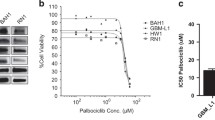In continuation of a preclinical study of the new alkylating anticancer drug chlonisol {2-[3-(2-chloroethyl)-3-nitrosoureido]-1,3-propanediol} created by us, its activity was assessed after intracranial transplantation of Ehrlich carcinoma and HER2-positive breast cancer into mice. Temozolomide, which is used in the treatment of malignant gliomas, was selected as an alkylating reference drug. Chlonisol significantly increased the median lifespan of tumor-bearing animals, surpassing temozolomide in activity for both tumor models. A comparison of survival curves of mice with HER2-positive breast cancer tumor transplants revealed no therapeutic effect of temozolomide, unlike an obvious increase in the survival of mice in the chlonisol group. Chlonisol can be a potential cytostatic agent in the chemotherapy of neoplastic lesions of the nervous system, which is extremely important in the treatment of HER2-positive breast cancer, which often metastasizes to the brain.




Similar content being viewed by others
References
A. N. Stukov, K. A. Esikov, L. M. Usmanova, et al., Khim.-farm. Zh., 54(6), 35 – 38 (2020); Pharm. Chem. J., 54(6), 579 – 581 (2020).
A. N. Stukov, S. F. Vershinina, N. N. Kharitonova, et al., Toksikol. Vestn., 165(6), 49 – 53 (2020).
L. A. Ostrovskaya, V. A. Filov, B. A. Ivin, et al., Ross. Bioterapevticheskii Zh., 3(1), 37 – 48 (2004).
Ya. G. Murazov, A. N. Stukov, Yu. G. Zmitrichenko, et al., Farmakokinet. Farmakodin., 1, 23 – 29 (2021).
W. Cruz-Munoz and R. S. Kerbel, Semin. Cancer Biol., 21(2), 123 – 130 (2011).
J. Chua, E. Nafziger, and D. Leung, Curr. Oncol. Rep., 21(4), 30 (2019).
S. Pernas and S. M. Tolaney, Ther. Adv. Med. Oncol., 11, 1 – 16, 1758835919833519 (2019).
V. N. Anisimov, P. A. Egormin, T. S. Piskunova, et al., Cell Cycle, 9(1), 188 – 197 (2010).
A. N. Stukov, L. V. Filatova, D. Kh. Latipova, et al. Vopr. Onkol., 61(2), 274 – 279 (2015).
J. Wang and B. Xu, Signal Transduction Targeted Ther., 4, 34 (2019).
Author information
Authors and Affiliations
Corresponding author
Additional information
Translated from Khimiko-Farmatsevticheskii Zhurnal, Vol. 56, No. 9, pp. 24 – 27, September, 2022.
Rights and permissions
Springer Nature or its licensor (e.g. a society or other partner) holds exclusive rights to this article under a publishing agreement with the author(s) or other rightsholder(s); author self-archiving of the accepted manuscript version of this article is solely governed by the terms of such publishing agreement and applicable law.
About this article
Cite this article
Alexandrov, V.A., Stukov, A.N., Zmitrichenko, Y.G. et al. Comparative Activity of Chlonisol and Temozolomide in Mice After Intracranial Transplantation of Ehrlich Carcinoma and HER2-Positive Breast Cancer. Pharm Chem J 56, 1179–1182 (2022). https://doi.org/10.1007/s11094-022-02773-1
Received:
Published:
Issue Date:
DOI: https://doi.org/10.1007/s11094-022-02773-1




